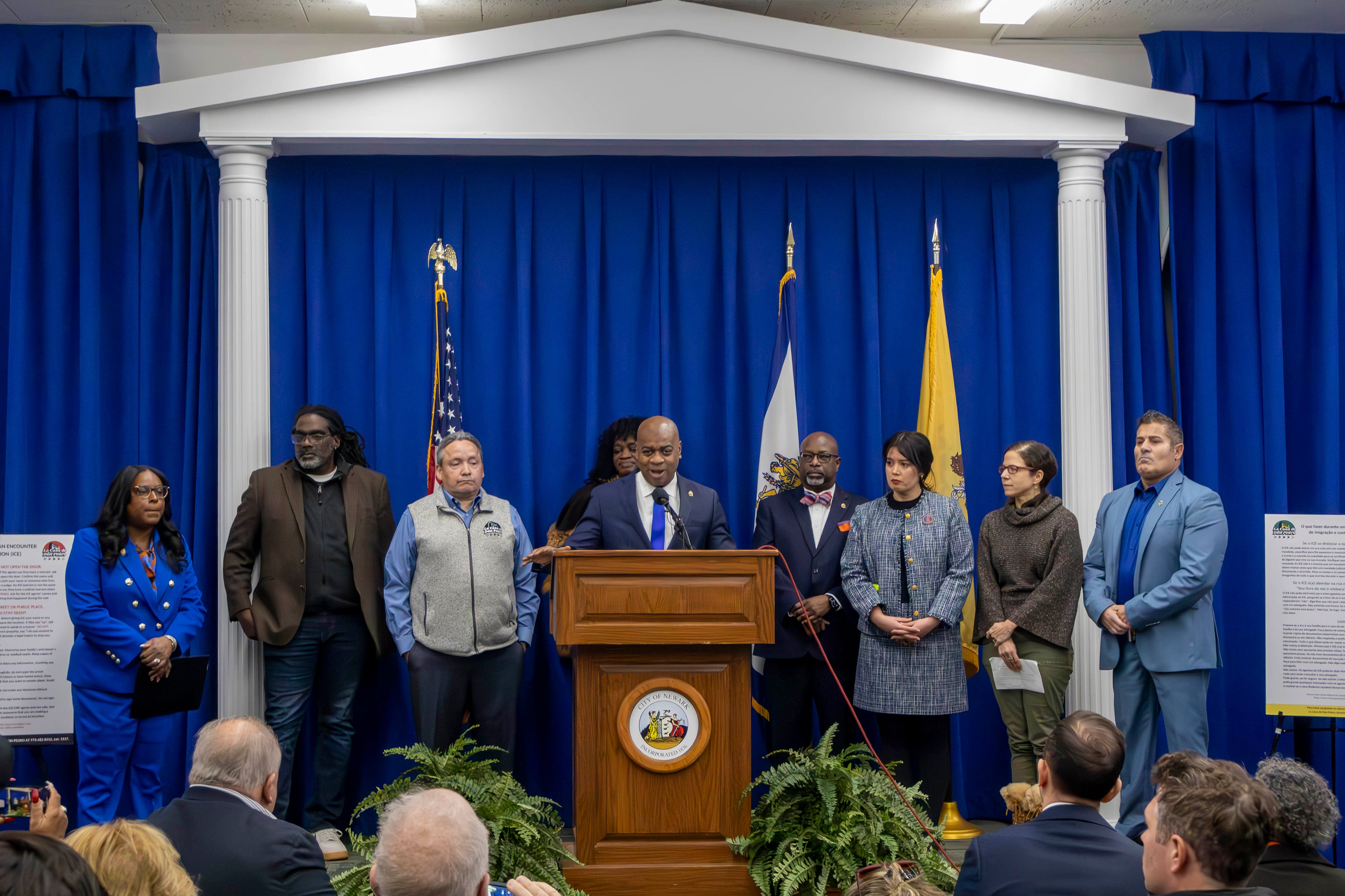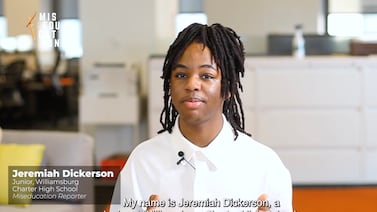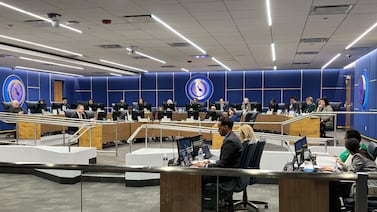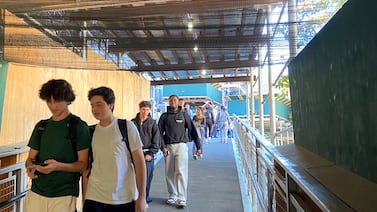Sign up for Chalkbeat Newark’s free newsletter to get the latest news about the city’s public school system delivered to your inbox.
Newark city and school leaders vowed to protect immigrant residents and their children, regardless of their immigration status, as fears and anxiety mounted following a raid by federal immigration agents at an East Ward business this week.
“Our neighbors and our family members — we have a right to protect them and we will protect them,” Newark Mayor Ras Baraka said at a news conference on Friday. “We’re going to stand on democracy here and we’re going to fight for all of our residents in this city.”
On Thursday morning, Immigration and Customs Enforcement officials, or ICE agents, entered a business in the Ironbound section of Newark, where they proceeded to detain and interrogate workers. Baraka said the agents showed no warrant before they began arresting workers, including U.S. citizens and undocumented residents. Among those detained, he said, was a military veteran.
When speaking with employees at the establishment, advocates said the workers described a forceful entry. Agents were “heavily armed,” blocking doorways, “scrambling up delivery ramps,” and “banging down bathroom doors to make sure no one was hiding inside,” said Amy Torres, executive director of the New Jersey Alliance for Immigrant Justice, who spoke with the employees who remained after the raid.
The Ironbound neighborhood, named for the railroad tracks that surround it, has historically been home to immigrant families. In recent decades, families from Central and South America have also moved in, with restaurants, bodegas, schools, day cares, and other small businesses sprouting up to serve those communities.
“I was appalled. Upset. Angry that this would happen here in this state,” said Baraka, to a packed room at City Hall. U.S. Rep. LaMonica McIver, state Sen. M. Teresa Ruiz, other state lawmakers, city council members, and leaders of nonprofit groups that serve largely immigrant communities in Newark were among the speakers at the event.
The raid came just three days after President Donald Trump took office and immediately signed a series of executive orders aimed at altering the nation’s immigration policies and rolling back longstanding rights and protections for immigrants. Trump this week also cleared federal immigration officials to make arrests at or near schools, which, along with churches and hospitals, were previously designated as “protected” from immigration enforcement.
At Friday’s news conference, speakers warned that the incident could have lasting, detrimental effects throughout the city, with parents choosing not to go to work and keeping children home from school out of fear.
“If they can’t deport and physically detain you, they want to detain you into the isolation of your own home — so you’re disenrolling your kid from school [and] when you are sick or having a health emergency, you’re too scared to go to the doctor,” said Torres of the chilling effect of ICE raids.
Torres added that Newark residents who are fearful should seek support from numerous organizations throughout the city that serve immigrant families. Among those organizations are La Casa de Don Pedro, Ironbound Community Corporation, and United Community Corporation, whose representatives were also at the news conference on Friday.
Ruiz, the state senate majority leader who’s from Newark, said she worries workers and students may have already begun staying home from work and school out of fear and increased anxiety.
“I’m afraid,” Ruiz said, pausing briefly to cry. “You know what my biggest fear is? That this happens inside of a classroom.”
Fear in schools ‘palpable’ after raid
Newark Board of Education members, Superintendent Roger León, and district teachers also addressed the heightened anxiety in schools at a board meeting Thursday night. León shared little detail about protocols to follow beyond a parent or teacher getting in touch with a student’s school principal if they have concerns.
Alexander Schuetz, a history teacher at Barringer High School, urged the school board to take a stand against allowing federal immigration officials into schools and to codify it with a policy. Schuetz said he fears that he will have to watch students “suddenly lose their family members or simply disappear.”
Another district educator, Mark Edelstein, echoed those comments. “I just want the board to know that the fear and uncertainty is palpable among the students, and I’m here to say that they belong here in Newark,” said Edelstein, who teaches English language learners at Barringer High School.
Just over 9,000 of the district’s total student population of about 37,000 are English language learners.
Board members urged district officials to be proactive in addressing attendance concerns.
District officials will remind school leadership about their responsibilities to keep students safe, León said. He encouraged students to seek an adult at their school for help in any situation and promised to brief board members on the specifics of the district’s plans.
“My expectation would be that [students] would always be able to come back to the school to have a loving, caring adult make sure that they’re okay,” León said.
Kalenah Witcher, a teacher at University High School, said she spoke with students on Thursday who said they were afraid. A Newark resident, Witcher added that many of her neighbors are immigrants who speak other languages and called on the district to also establish communication with those parents.
“We need to move a little deeper to sort of establish and maintain communication with those parents, because a lot of times those parents dispatch the older children or the students themselves to advocate and move information,” Witcher said.
Emergency deportation plans, shelter-in-place drills
Peter Rosario runs several early childhood education programs throughout the city in his role as president and chief executive officer of La Casa de Don Pedro, a longstanding community organization.
In preparation for anticipated raids from federal immigration officials, he and other leaders in his organization discussed which protocols to use should ICE agents approach their doors.
“We literally were wrestling with, ‘is this shelter-in-place, is this active-shooter’ — what do we do?” Rosario said in an interview with Chalkbeat after the news conference on Friday. “I think every school has to pick the right answer for themselves and practice it.”
“Will they leave their guns in the lobby or will they bring their guns with them into our classrooms? These are the real questions that we, as providers, are asking,” Rosario said.
He added that his organization has been urging parents to create “deportation plans” that include gathering official documents and creating a list of trusted relatives who can be added to school pickup lists.
His organization, along with others in the community, are also looking into additional mental health support for children and their families, he said.
“Our concern is also the psychological trauma, the transference of trauma to the kids,” he said. “That’s what we’re wrestling with and trying to educate our staff to start looking for signs.”
Jessie Gómez is a reporter for Chalkbeat Newark, covering public education in the city. Contact Jessie at jgomez@chalkbeat.org.
Catherine Carrera is the bureau chief for Chalkbeat Newark. Contact Catherine at ccarrera@chalkbeat.org.






